Experiments
An experiment is a scientific procedure used to test a hypothesis, demonstrate a known fact, or examine the effects of a particular variable. It is a key component of the scientific method and is used to investigate and understand the natural world.
Types of Experiments
- Controlled experiments: These are experiments in which all variables are kept constant except for the one being tested. This allows researchers to isolate the effects of the variable they are interested in.
- Field experiments: These experiments are conducted in real-world settings, such as in a natural environment or a social setting. They allow researchers to study phenomena in their natural context.
- Laboratory experiments: These experiments are conducted in a controlled environment, such as a laboratory, to allow for precise measurements and control of variables.
- Randomized controlled trials (RCTs): RCTs are a type of experiment in which participants are randomly assigned to different groups, with one group receiving the treatment or intervention being studied and the other serving as the control group.
Steps in Conducting an Experiment
- Identify the research question: This is the first step in any experiment, where the researcher formulates a question to be answered through the experiment.
- Formulate a hypothesis: A hypothesis is a testable prediction about the relationship between variables. It is an educated guess that can be supported or refuted through experimentation.
- Design the experiment: This involves determining the variables to be tested, the methods for data collection, and the procedures for conducting the experiment.
- Collect and analyze data: Data is collected during the experiment, and then analyzed to determine the results and draw conclusions.
- Draw conclusions: Based on the data analysis, the researcher draws conclusions about whether the hypothesis is supported or refuted.
- Communicate results: The findings of the experiment are communicated to the scientific community through scientific papers, presentations, or other forms of communication.
Benefits of Experiments
Experiments are valuable for several reasons:
- They allow researchers to establish cause-and-effect relationships between variables.
- They can be used to test and validate scientific theories.
- They provide a systematic way to answer scientific questions and make new discoveries.
Study Guide
Here are some key points to remember when studying experiments:
- What is the purpose of an experiment?
- What are the different types of experiments, and how do they differ from each other?
- What are the steps involved in conducting an experiment?
- Why are experiments important in scientific research?
Understanding these key points will help you grasp the significance of experiments in the scientific method and their role in advancing scientific knowledge.
Good luck with your studies!
[Experiments] Related Worksheets and Study Guides:
.◂Science Worksheets and Study Guides Second Grade. Mammals and birds
Study Guide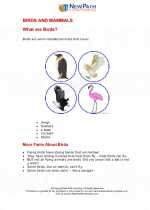 Mammals and birds
Mammals and birds  Activity Lesson
Activity Lesson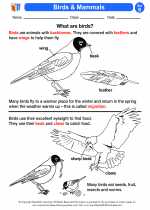 Birds & Mammals
Birds & Mammals  Worksheet/Answer key
Worksheet/Answer key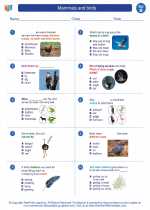 Mammals and birds
Mammals and birds  Worksheet/Answer key
Worksheet/Answer key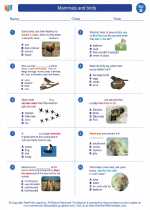 Mammals and birds
Mammals and birds  Worksheet/Answer key
Worksheet/Answer key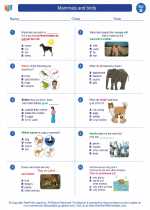 Mammals and birds
Mammals and birds  Worksheet/Answer key
Worksheet/Answer key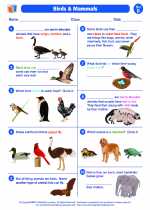 Mammals and birds
Mammals and birds  Vocabulary/Answer key
Vocabulary/Answer key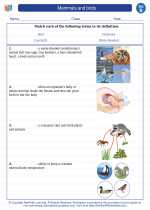 Mammals and birds
Mammals and birds 

 Activity Lesson
Activity Lesson
 Worksheet/Answer key
Worksheet/Answer key
 Worksheet/Answer key
Worksheet/Answer key
 Worksheet/Answer key
Worksheet/Answer key
 Worksheet/Answer key
Worksheet/Answer key
 Vocabulary/Answer key
Vocabulary/Answer key

The resources above cover the following skills:
LIFE SCIENCE (NGSS)
Biological Evolution: Unity and Diversity
Students who demonstrate understanding can:
Make observations of plants and animals to compare the diversity of life in different habitats[Clarification Statement: Emphasis is on the diversity of living things in each of a variety of different habitats.] [Assessment Boundary: Assessment does not include specific animal and plant names in specific habitats.]